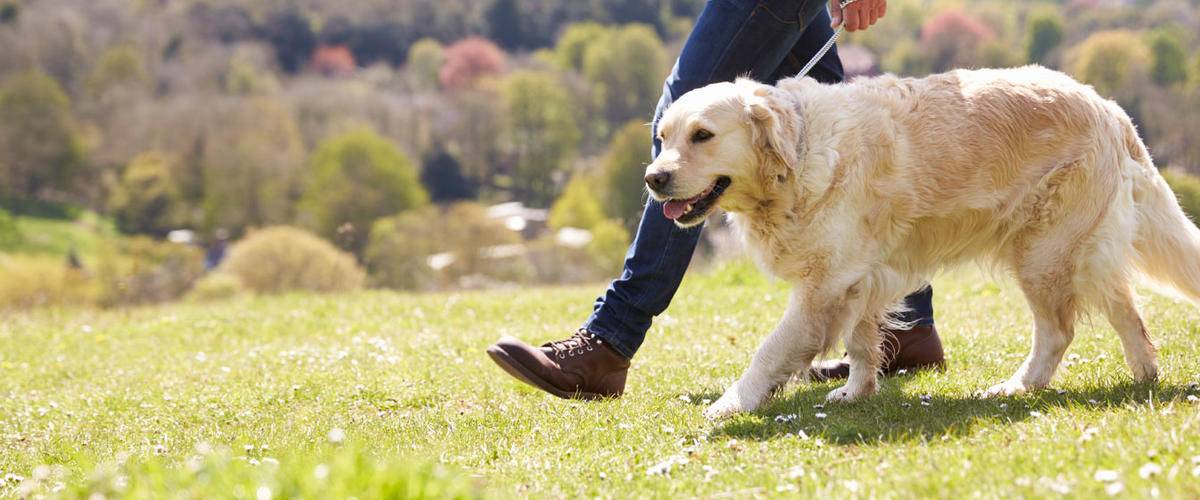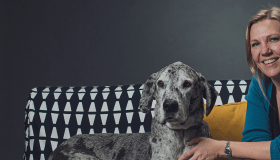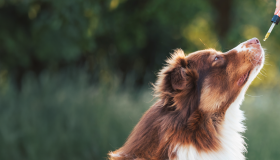
May 12, 2022 — Dr. Kelly Diehl chats with Dr. Julia Labadie, Golden Retriever Lifetime Study epidemiologist, and gets an update on the latest facts and figures as the Study reaches its tenth anniversary!
Resources:
Golden Retriever Lifetime Study webpage
Golden Retriever Lifetime Study podcast 2018
Golden Retriever Lifetime Study: effects of spaying or neutering large-breed dogs podcast 2019
0:00:00.6 Kelly Diehl: Since we recorded this episode, our guest, Dr. Julia Labadie, has left the Foundation for private industry. However, the information presented is timely, and it was a really great interview, so I hope you enjoy it. On to the show!
0:00:27.3 KD: Welcome to this episode of Fresh Scoop, where we're going to get a Golden Retriever Lifetime Study update. Hooray. I'm your host, Dr. Kelly Diehl, Morris Animal Foundation's Senior Director of Science and Communication. And today, we'll talk to our very own Golden Retriever Lifetime Study epidemiologist, Dr. Julia Labadie. So, welcome, Julia.
0:00:49.8 Julia Labadie: Thanks so much for having me.
0:00:51.7 KD: Even though we see each other all the time, this is great, but you know, Julia, I don't know this question; I ask this of everybody. Before we get started, can you tell us a bit about yourself and what first led you to become a veterinarian?
0:01:04.9 JL: Yeah, of course. So, I actually grew up in Northern California, in a family that loved animals. We had everything from cats and dogs, birds... I even had a pet frog named Cutie. When we had family gatherings, the dogs often outnumbered the people, so I think it was kind of logical I would end up as a vet. But really, what started it was my love for horses, and so, when I was about 6, I rode a horse for the first time, and I was hooked. And I started taking lessons, and by the time I was 12, my parents broke down and got me an Arabian Show Horse, who actually still is in my backyard today; he's going to be turning 32 this year.
0:01:42.7 KD: Wow.
0:01:43.8 JL: I got really into the Arabian Show world and traveled all over the US and Canada to compete, and with any high-performance athlete comes injuries, so I think caring for my horses through injuries and setbacks is what really got me thinking about becoming a vet. And then, we also had three golden retrievers growing up, and all of them sadly died of hemangiosarcoma, so that's been a big driver in my research career and why I love my job so much.
0:02:09.9 KD: Great! I'm also going to ask you, because I think there are probably folks listening who don't know what an epidemiologist is, so if you could define that, and also, what led you then to specialize in that particular field?
0:02:28.7 JL: Yeah, it's funny, because two years ago, whenever I told people that I was in an epidemiologist, their response was always "So do you study skin?" And now, thanks to COVID, more people actually have heard of the term. So, in short, epidemiologists study the distribution and determinants of disease. So, with COVID, we can see that clearly, in that they dig into the data and sort of look at who is the most at risk of COVID, how quickly it's spreading, etcetera. But there's also a whole field of epidemiology that specializes in chronic diseases like cancer or heart disease, and much of this work is focused on what we call risk factors for disease, so that's trying to figure out what characteristics or exposures in a person or dog make them more likely to get a disease of interest. So, a great example of this was when we first connected the fact that people who smoke are more likely to get lung cancer. So, I've always been a huge math and science nerd and obviously had a love for veterinary medicine, but I never felt like full-time clinical practice was right for me. So, when I heard about epidemiology, it just seemed like the perfect mix of all of my interests, and I love being able to use data and statistics to improve both human and animal health.
0:03:42.4 KD: Great, and that's a great lead-in, Julia. I know a lot of folks who are listening are going to be interested in what we're going to discuss next, which is catching people up a little bit on some of... I use the word statistics, but that's not right; just some of the data that is current for our Golden Retriever Lifetime Study. So, to begin with, can you tell us how many dogs are active in the study, how many have died, and the average age of the study participants?
0:04:15.4 JL: Yes, definitely. So currently, we are super fortunate to still have over 2000 dogs that are enrolled and active in the study. The median age is about nine years now, but that ranges from about 7 and a half to 12. Just over... Or just under 500 dogs have passed away at this point, and about 450 are no longer actively participating in the study, so this could either be dogs who officially withdrew or just that sort of got busy and haven't completed any questionnaires for a while.
0:04:49.0 KD: Okay, and before we get into the next discussion, can you remind everyone about the objectives set out at the beginning of the study?
0:05:00.6 JL: Yeah, so the overall goal of the study was to evaluate risk factors for cancer in golden retrievers. And they were interested in a very broad range of risk factors, so people who have filled out our questionnaires know that we ask all about these dogs' lives. So, anything from nutritional, environmental, lifestyle, reproductive, or genetic factors. So, one of the primary goals was to evaluate for specific cancers that are common in golden retrievers, which we call primary endpoints. So, these four cancers are hemangiosarcoma, lymphoma, osteosarcoma, and high-grade mast cell tumors. And the original goal was actually to only continue the study until we reached 500 total diagnoses of those four cancers, but we were fortunate enough to obtain funding to now continue to study until all the dogs have passed away. So, in addition to these four primary cancers of interest, we're also interested in all other disorders that affect these dogs, including other types of cancers, or other common diseases such as hypothyroidism, osteoarthritis, or allergies.
0:06:07.6 KD: Great. That's good news about... I get... About continuing till all the dogs have passed because I think you probably get this question too, Julia, for a while, right. We were going to stop at 500, and it was always hanging in the air whether we could go further, and I think we'll get a lot of data by being able to continue on, so that's... That's awesome. Speaking of cancer, and I know you get these questions, I get these questions in my role in marketing is, how many dogs have been diagnosed with cancer that are in the study? And can you fill us in on some of the information you're seeing now that we've been... Going to be going into our 10th year, which is amazing, soon, and of course, we're racking up more cancer diagnoses?
0:06:57.7 JL: Yeah, so, right now, we have about 300 dogs who have gotten our... One of our four primary endpoint cancers, so 166 have been diagnosed with hemangiosarcoma: that's our most common one by far. Lymphoma, we have about 100 dogs, and then, fewer than we expected with high-grade mast cell tumors and osteosarcoma: about 10 to 15, each of those. We do also have a lot of other common cancers, so low-grade mast cell tumors have been very common; just over 89 of those. And we've seen more dogs with a tumor called histiocytic sarcoma than we expected, so we have 31 of those now. And then various other... Every cancer we could think of, really; there's been various other types as well.
0:07:44.7 KD: Right, and thanks for reminding everyone about sometimes being... We have to be kind of nimble, right? I know you have. The... I mean, certainly, we need structure to this study, but I think the idea is to be able to collect everything and look at it critically. I'm going to ask you a question I wasn't at first going to ask you, and I don't want to put you on the spot. So poor Julia's probably like "What are you going to ask me?", but you just gave, and I'm going to direct everyone to a Golden Zoomies webinar that Julia participated in in December of 2021; I'll put these in the show notes. But Julia, can you very quickly talk a little bit about the tiers of cancer diagnoses, because when we started, we just were like "Yeah, just... We're just going to collate all this cancer, and it's going to be great," but as we've gone on, we've learned that not everybody does things the same way and tell everyone about how we stratify our samples and data.
0:08:58.7 JL: Yeah, definitely. So, data integrity is very important to any science, so knowing that... If we say a dog has hemangiosarcoma, we're really certain, because if it's possible that it's a different tumor type, we could be, you know, making it more difficult to find significant associations with what causes that disease. So, we devised what we call the tiers of diagnosis. So, a tier one diagnosis for cancer is something we're very certain of, so either they had a biopsy with a board-certified pathologist that reviewed it, or for certain cancers, we would accept a board-certified review cytology, so lymphoma is a great example of that. Tier two diagnoses are ones that we're pretty confident have that type of cancer, but we... We haven't been able to confirm it with a sample, so whether we had an MRI where we could see a brain tumor, that we weren't able to actually sample that tumor, or some convincing x-rays that look like a characteristic osteosarcoma.
0:10:00.9 JL: Tier three are more of just a strong clinical suspicion, so if we had a dog that had a bleeding tumor on the heart, we'd be pretty suspicious of hemangiosarcoma, so we would call that a tier three diagnosis. And so, we'll be able to use those to sort of stratify which samples are a priority for... Like lab-based tests, where we need to be really certain that we have the diagnosis of interest, versus studies more like data-driven, where we could maybe try to look at an analysis of the ones we're confident of, and then maybe also compare with the ones we're... We're suspicious of and see if we see any differences there. So, hopefully, we'll be able to use that in that way.
0:10:44.3 KD: Great. Thanks, Julia. Part of the reason I asked Julia that question is it leads in nicely to our next discussion; another question I get asked a lot, and probably Julia as well, because we have shared data and samples with outside researchers, and I thought maybe... And you don't have to be exhaustive in your description. Could you fill us in a little bit on some of the projects, past and present, and what they are using your use samples and data for, just to give people a good... Kind of an idea of what... What's going on out there.
0:11:23.3 JL: Yeah. We have so many exciting collaborations going on right now. Since we get samples every year from the dogs in our study, we have a really unique opportunity to identify dogs who get cancer, and then go back in time and look at their samples before they were diagnosed and see if there's any differences we can detect. And if we're successful with that, we could potentially use that information to develop tests to diagnose cancer early or help us have a better prognosis for those dogs. So, with that in mind, we have a few big collaborations kind of looking at that right now, so I thought I would maybe highlight those. So, one is Dr. Geoff Wood, who's at University of Guelph in Canada. He's looking at microRNA signatures, so these are little, tiny bits of genetic material that can circulate in the blood, and he's trying to identify whether dogs with lymphoma have altered levels of certain microRNAs, and then looking at how far back in time he can detect those changes. Another one is Dr. Tom Roseberry, who's at Loyal; a company called Loyal, and he's looking at a different genetic marker, DNA methylation, and that's a way that the body regulates protein production. So, his team is looking at whether dogs with cancer have different patterns of methylation, and at what point in time those changes develop.
0:12:45.4 JL: And then, a third one is Holly Ganz, who works for AnimalBiome. She's looking at the fecal microbiome, which is sort of a measure of bacteria that's present in a GI tract. And so, her team is trying to assess whether changes in either the amount or the types of bacteria present might actually be able to predict an impending cancer diagnosis. And so, you mentioned that Golden Zoomies webinar from back in December; we actually were very fortunate to have both Geoff and Tom talk about their research, so if people want to learn more, they should definitely check out that video because they go into a little bit more detail about their findings.
0:13:21.6 KD: For sure. And just... The Golden Zoomies is a really good one, and just for folks listening who are thinking about the methylation that Julia mentioned, part of that is remembering that methylation has to do with our genetic material, and it's an alteration that can maybe turn a gene on or off, right, Julia? And so, we now think of cancer as really a... It's a weird thing to say, but I have a good friend who's an oncologist, and he goes "Cancer's actually a genetic disease." [laughter] And... You know, it has to do with dysregulation of cell division, etcetera, and we think of cell division, but even... If you go back even further to cell... From cell division, you're talking about changes in how the chemistry of the cell works, and methylation is part of that, and it's a pretty exciting... And you can correct me if I'm wrong, Julia; it's a hot area, I believe, in human medicine and oncology as well.
0:14:23.0 JL: Yes, it's definitely something that's been kind of increasing in the dog world as we sort of mimic what's going on in the human world. And so other people may have heard of this as epigenetics. It's the same concept of looking at how DNA is methylated.
0:14:38.2 KD: Right, and how outside influences influence our body. Is that the... That's kind of how I think of it, as... Of epigenetics a little bit too. Isn't that right?
0:14:50.0 JL: Yeah, it definitely is a lot of things like environment that can actually change your epigenetics, and so, hopefully, at some point, we'll actually be able to take into account some of our environmental data in conjunction with epigenetics and see if we can even better predict which dogs will get cancer that way.
0:15:08.6 KD: Right. So... And as Julia mentioned, we have lots of other sample and dogs with other diseases, so it'd be really interesting. Julia doesn't just help... I mean, she helps a lot of folks [laughter] get with the data when they ask us for, but Julia, kind of tell people what projects you're working on and kind of what your day at Morris as an epidemiologist looks like.
0:15:33.5 JL: Yeah, so currently, I'm working on a couple of internal collaborations, and one of these is actually not cancer-focused. So, like you just said, we have so many other diseases, and the dogs are still comparatively pretty young, and so, we haven't quite hit the high numbers of dogs with cancer to do sort of a more traditional epidemiology analysis, so I am collaborating, actually, with the veterinary behaviorist at UC Davis named Melissa Bain, and we're looking at the relationship between dietary protein level and behavior in our population. So past research has actually suggested that dogs on high protein levels have more... Or high protein diets have more aggressive tendencies, so we're trying to look at whether this is true in our data set, since we have such detailed diet information. And then we also recently got all of our genotyping data back, which is really exciting; that's been a huge project to get all of that. So, my next big project is actually going to be trying to look at genetic risk factors for cancer in our dogs, and so this is germline genetic, so the genetics the dogs are born with, which is in contrast to the methylation, which is... Which can change over time in a dog.
0:16:45.1 KD: Right, and that's really cool, and I think, actually, if people are kind of running this through their minds while you're listening, yes, you can, in some cases, look at a dog pre-cancer and post-cancer, right Julia? And compare the same dog. I've seen studies where they actually... People have actually looked at the DNA in cells that are not affected by cancer and right next door, so that... Has cancer. So, our technology has advanced, and the costs have decreased, such that we can do that kind of analysis, and Julia mentioned the genome information. Can you... For people who really may not know, can you talk a little bit about what that all is?
0:17:30.6 JL: Yeah, so there's a lot of different ways we can get information on a dog's genetics. So, what we've actually started with is what we call genotyping, so it's an array where you actually get to certain areas of the genome; you know which base pairs they are, and you can make assumptions about the dog's entire genome based on that, whereas another option to actually sequence every base pair in the genome, which is much more data-intensive and more cost-intensive. So, what we're hoping to do is to start with this genotyping data and sort of plan projects going forward with that. And so, like you just mentioned, one of the projects we can do is actually sequencing the tumors of these dogs, so we do have banked tumors in a lot of dogs, and also banked normal tissue for a lot of them as well, and so, we're starting conversations about how we want to go about genotyping those so that we can make comparisons as well or that would be genetic sequencing, yes.
0:18:33.6 KD: Right. And... For people who are listening who may not be... Who are more laypeople, why do we even care what the genetic... Like the fine level of DNA analysis in these dogs? Like, why... What are we going to... Thinking about using that data for, for projecting?
0:18:58.7 JL: Yeah, I think one of the most basic options is if we could look at a dog when they're a puppy and get their genotyping information and say "Hey, you're at risk of getting this cancer," so maybe we can change some lifestyle things in that dog or more closely monitor it to hopefully catch it early. Another option would be sort of targeted breeding to make sure that dogs that are at high risk for cancer maybe aren't continuing to spread their genetic pool, but that's... That's definitely a field that is out of my expertise. I don't do anything with breeding but... But there are definitely other people who can help advise that as well. But I think, from my perspective and the kind of work I do, definitely just being able to give more targeted care to dogs that we know are at an increased risk of developing these diseases.
0:19:45.4 KD: Right, and Julia mentions a good thing that makes me think. We talked about the data that we're collecting, and a lot of it is environmental data, right? And Julia touches on a subject, which is if you had... For example, if you had a history of lung cancer in your family, it'd probably be a good idea if you never smoked, right? And so, if we can find some information where we... I say, "Well, if you have this genetic make-up like BRCA1 variant gene in women with breast cancer, you would monitor that person differently than if you didn't have it, and Julia, maybe you can give some other examples of what... Where we might alter lifestyle for animals.
0:20:30.5 JL: Yeah. So, I think a big risk factor for chronic diseases in both humans and dogs is obesity, and so, having... Keeping your dog lean is something that we can definitely alter at a younger age, keeping them more fit, increasing physical activity. Perhaps from this data, we'll actually be able to make dietary recommendations as well, we're not quite there yet. But I think definitely, for a disease like hemangiosarcoma, if we know a dog's at risk, we could do regular ultrasounds to look at their spleen and heart and make sure that they're not developing any tiny tumors that we could maybe take out.
0:21:09.2 KD: Those are great... Those are great examples, and... We are really, I think, in veterinary medicine with some of this, in our infancy compared to some human studies, where we know risk factors, but I'm hoping, with all the data we have, that that may be something that will eventually come out of the study, and that's a question, I don't know about you, Julia, I'm sure you get asked. That seems to be a common question for the folks who are in this study, right? You know, risk factors that they can manipulate on their own. And I think the obesity one is a good example but what else are you finding maybe that has surprised you when you look at the data so far?
0:22:00.5 JL: Yeah, I think... Maybe not surprising, but we have a lot of dogs with allergies, and that's something that I... I see in my spare time when I'm at clinical practice, that allergies, I think, seem to have gotten worse in dogs recently, and there's multiple breeds that are really predisposed to these, and it can be really frustrating for owners and dogs; it definitely affects quality of life of both of them. And so, if we can use this data to help improve that in any way, I think that'll be a very exciting direction, and I don't think it was necessarily one of our primary goals, but I think it's a place that we can make a big effort.
0:22:38.1 KD: Yeah, that's a great... That's a great point, I think, that there are... You know, we talk about that, and people now are deviating off the subject a little bit, but years ago, because I'm an old person, what I was doing... And I know Julia's heard of this, and folks who are listening may have heard of what we used to call the hygiene hypothesis, which was like "If you grew up on a farm, you're going to have less chance of having allergies," and then people looked at it more, and then we learned more about the microbiome, which is all the bugs that share our bodies with us, and that they're not just along for the ride; they do things to help or potentially change our metabolism. And it'll be interesting to see, because you've touched on a point that I think we have lots of samples that people could look at for all different things, and actually, that brought me to another question, which is, if people are listening and are interested, where can they find all kinds of information about the study?
0:23:39.8 JL: Yeah, so the Morris Animal Foundation has a web page for the Golden Retriever Lifetime Study, and that has information sort of broken down for owners, for vets. There's a dashboard, and there's a link for more information on our request for proposals process, so if people are interested in accessing our data or samples, that's a great place to go for more information.
0:24:02.0 KD: For sure. And I would also direct people, as we've already mentioned, and again, I'll put it in the show notes; we have two older podcasts that we did way back. In fact, the first episode we ever did was focused on the Golden Retriever Lifetime Study, and we have the Golden Zoomies that were mentioned, which are webinars quite focused on the study and golden retrievers, but there's great information that applies to all breeds of dogs, and it's... Those are available and I'll put the link on our YouTube channel. So, wrapping things up, Julia, what's kind of your take home message for all of our listeners as far as where we're at, where the study's going, and what's going on right now?
0:24:50.7 JL: Yeah, I think something I hear all the time is sort of like, "Why don't we have an answer about cancer yet?" And I think, you know, what's heartbreaking is we're getting more and more diagnoses everyday right now, but that also means that we're getting a lot closer to having enough statistical power to actually do what we set out to do, so when we only have 100 dogs with a certain type of cancer, we can't really do these big epidemiologic studies to try to look at all these factors because we just don't have the power, but we're getting really close to being able to truly investigate why these dogs get cancer and what we can do to prevent it, so I'm really excited and optimistic for what's going to come out of this study soon, and I know it's going to impact dogs everywhere.
0:25:35.0 KD: It's a really interesting and great study. It's hard to believe we're 10 years into it, and we've got a ways to go, as Julia mentioned. Some of our young dogs, they've got maybe four or five years, right? Or more, hopefully, in front of them before they're gone and it's a great repository of samples. And as Julia mentioned, if there's anyone listening who is interested, check out those resources. And that really does it, wow, for this episode of Fresh Scoop, and once again, thanks to Dr. Julia Labadie for joining us. We'll be... Oh, did I just pronounce your name wrong again?
0:26:18.8 JL: No, it was close enough. Labadie. [chuckle]
0:26:19.9 KD: Labadie. I have it written down here. Sorry, you guys who are listening. I've known Julia for almost two years, and I never have to say her last name, and it has befuddled me. We'll be back [laughter] with another episode, of course, next month, that we hope you'll find just as informative, and the science of health is ever-changing, and veterinarians need cutting-edge research information to give their patients the best possible care, and of course, that's why we're here. You can find us on iTunes, Spotify, Google Podcasts, and Stitcher, and please, if you liked today's episode, we'd sure appreciate it if you take a moment to rate us because that helps others find our podcast, and I know... For those of you who are hardcore podcast listeners, I know you hear that all the time; I hear it when I listen. But it really does make a difference, and we want to try to get good science out there to people; I know they're hungry for it. And again, by rating us, you help people find us. To learn more about Morris Animal Foundation's work, of course, go to morrisanimalfoundation.org, and there, you'll see just how we bridge science and resources to advance the health of animals. You can also follow us on Facebook, Twitter, and Instagram. I'm Dr. Kelly Diehl, and we'll talk soon.




